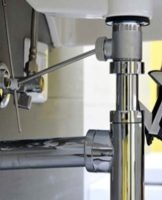Tips on how to properly flush the boiler from the smell of hydrogen sulfide
It is difficult to imagine everyday life without the use of hot water, and therefore some install special boilers to warm the liquid. Over time, an unpleasant smell of hydrogen sulphide appears inside the boiler structure, which must be eliminated. However, before that you should figure out how to properly flush the boiler from the smell.
Features of the design and principle of operation
Before you start cleaning, you need to understand the main features of different types of structures, as well as the principle of their operation.
Accumulation
Most often, people install storage boilers in apartments. The main difference between these models and other products is that the heating component is located inside the tank. The liquid is heated using electricity. During the heating process, the liquid constantly circulates inside the product.
Among the disadvantages of storage models is the fact that they consume electricity throughout the day. Due to this, a device consumes more than one kilowatt of electricity per day. Therefore, such models are not suitable for people who want to reduce their energy consumption.
Flow
People interested in more compact products should pay attention to circulation boilers. Such structures are very small, since their size does not exceed the dimensions of an average shoebox. Thanks to this, air circulation heaters will not take up too much space and will fit into any interior.
The main advantage of this boiler system is its cost, since it is several times cheaper than storage technology. They also do not consume a lot of electricity, which makes it possible to reduce the consumption of electricity when heating a liquid.
Electric
Electric powered products are very popular. They are known for their ease of use and reliability. Heating of the cold liquid is carried out using a heating element installed inside the heating system. The tanks of electric models are made of metal materials that do not rust and prevent the development of corrosion.
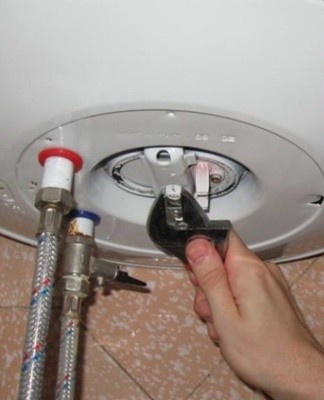
The advantages of electric boilers are:
- ease of installation, allowing people who have never done it to install the structure;
- the possibility of connecting the product to two or more water sources;
- a large amount of heated liquid.
Among the disadvantages of electrical structures are:
- prolonged heating of the liquid;
- clutter.
Gas
Such vessels heat the liquid using a built-in gas burner.Boilers of this type are available with a closed and open combustion chamber. It is recommended to use closed models because they do not need additional airflow to improve combustion.
The surface of these structures has a special protective coating that prevents the appearance and development of rust.
Gas boilers have the following advantages:
- low cost compared to electrical structures;
- corrosion resistance;
- high-quality thermal insulation, due to which the water will not cool for a long time.
The disadvantages of gas boiler structures are:
- large sizes;
- continuous gas flow to maintain liquid temperature.
Diagnostic
There are several common causes of unpleasant odor that need to be identified and eliminated in time.
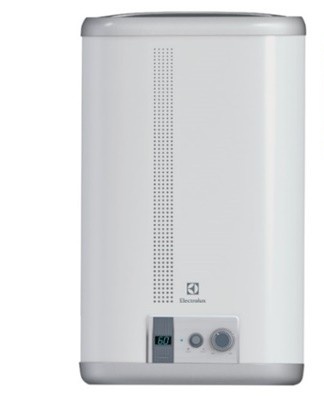
The problem with the storage water heater
Often the inside of the boiler begins to smell unpleasant due to failures of the storage water heating element. There are the following reasons for water heater failures:
- Unstable voltage in the network. Sometimes a part stops working properly due to power surges. Therefore, it is recommended to connect electrical equipment to special stabilizers.
- Formation of corrosion or scale on the surface. Over time, rust and other deposits appear on the water heater, affecting its performance. Therefore, it is necessary to periodically clean the heating element.
- Repairs done on time. If a small malfunction of the heater is not eliminated in time, over time it will stop working.
Water quality
Another reason why the boiler may have an unpleasant odor is poor water quality.Often, poor-quality liquid is supplied from the water supply system, which initially gives off an unpleasant odor. Since it can be stored inside the tank for a long time, the aroma remains even after the water has been removed from the boiler.
In this case, you can avoid unpleasant odors by using special filters. They connect to the plumbing system and clean the liquid of germs and eliminate odors.
Pipe inspection
If an unpleasant smell appears in the boiler, it is necessary to check the pipes and the material from which they are made. Most often, the aroma appears when connecting a boiler structure to a plumbing system consisting of metal pipes. Over time, rust and plaque appear on their walls, which begins to smell bad. The smell, together with the water, enters the tank, which is why a smell appears there. Therefore, it is recommended to inspect and clean the pipes every six months.
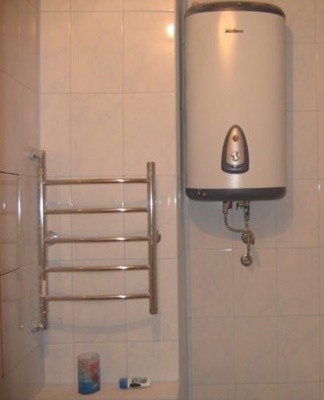
Backwater
The unpleasant odor is often caused by bacteria accumulating inside the boiler tank. They accumulate due to the fact that cold water is in the water heater for a long time. This stagnation promotes the development of bacterial microorganisms. Therefore, experts advise, as a preventive measure, to warm the water at least once every 20-35 days. If you heat the liquid too often at a low temperature (35-45 degrees), a smell will also appear because of this.
Phenols and formaldehydes
If the water inside the boiler starts to smell like anise, plastic or gouache, it's time to check the water for formaldehyde or phenol.These trace elements are very dangerous, as they can harm the human body. Even a small amount of substances leads to a deterioration in the functioning of internal organs and headaches. Components often enter the liquid through the surface of plastic pipes.
magnesium anode
Most boiler structures have a magnesium anode which is used to prevent rust from forming inside the tank. With prolonged use, the anode wears out and must be replaced with a new one. If you do not replace it in time, the water will have a metallic taste and aroma. To eliminate this problem, you will need to change the anode and flush the boiler tank.
GOOD
Sometimes people take water not from the network, but from their own water source, therefore, the problem of an unpleasant odor in the tank may be related to the well. It can contain a lot of hydrogen sulfide, which dissolves in water and gives it an odor. It resembles the smell of rotten eggs. If such a stench appears, you will need to install a filter in the well to remove hydrogen sulfide. It's the only way to get rid of the stench.
Methods of eliminating odors
There are several methods for removing the unpleasant stench, which you should familiarize yourself with in advance.
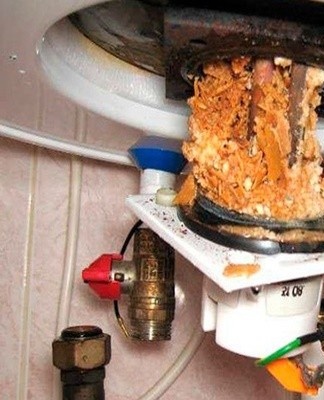
Elimination of external causes
There are three ways to eliminate external causes of odor inside the tank:
- deepening of a well or well from which water enters the boiler for additional heating;
- installation of additional filtering components to purify the liquid that enters the water supply system of the house;
- ask the water department for help and complain about poor water quality.
Elimination of internal causes
Sometimes the external factors do not affect the odors inside the tank in any way and therefore you need to get rid of the internal causes. To do this, perform the following actions:
- completely clean the liquid boiler;
- fill the tank with new water;
- turn on the heater and warm the liquid to 80-85 degrees;
- do not turn off the water heater for 2-3 hours;
- drain the heated water again;
- fill the boiler with cold liquid and activate normal operation.
Expert tips and tricks
To quickly remove the aroma, you need to read the recommendations and advice of experts:
- if a slight odor appears, the boiler tank is immediately cleaned and washed;
- if washing does not help, the water supply system is equipped with a purifying filter;
- the boilers are cleaned 1 or 2 times every six months so that microbes do not accumulate there.
Rules of maintenance and operation
Several boiler operating rules must be observed:
- the water heater should heat the water up to 60 degrees or more;
- if the boiler is not used for a long time, water is drained from it;
- when using a heater, the pipes must be monitored so that they do not clog.
Conclusion
Over time, the water in the boiler begins to stink, and you need to eliminate the unpleasant smell. Before that, you need to familiarize yourself with the causes of the unpleasant odor and the methods for its elimination.


